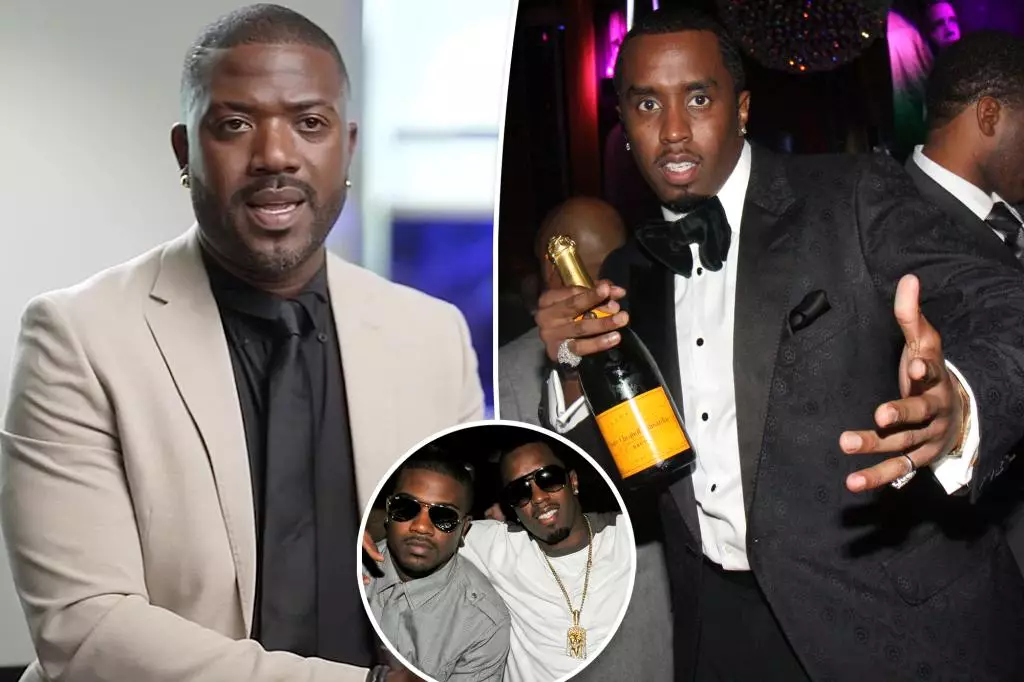In a shocking turn of events, Ray J has found himself at the center of a media storm following his candid conversation with TMZ’s Harvey Levin regarding Sean “Diddy” Combs and the allegations surrounding him. This encounter sheds light on the complex world of celebrity secrets, cover-ups, and the moral ambiguities that often permeate the upper echelons of fame. The discussion quickly escalated as Ray J implied that several high-profile individuals are manipulating narratives to shield their own reputations amidst Diddy’s massive legal troubles.
Ray J’s statement, “too much,” hints at the layered intricacies and hidden truths that lie beneath the glamorous surface of celebrity life. He contends that many victims are deliberately keeping quiet, perhaps due to financial arrangements that ensure their silence. This situation presents a broader critique of Hollywood culture, where monetary incentives may override ethical considerations. It emerges as a disturbing reflection on the lengths to which individuals will go to maintain their stature and avoid public scrutiny.
By indicating that “Somebody pays you to keep it quiet,” Ray J underscores a grave issue that transcends mere industry gossip; it speaks to systemic problems within the entertainment world. The concept of “catch and kill” references not just the preservation of reputations but the very fabric of honesty and transparency in a space often riddled with manipulation. The insinuation that A-listers engage in such arrangements evokes a chilling reminder of how power dynamics can operate, leaving less influential voices suppressed.
As the conversation unfolds, it is evident that Ray J holds significant knowledge about these interactions, stating that many individuals feel they can confide in him about their experiences with Diddy. This implies a communal atmosphere of fear and silence among those who have faced alleged misconduct. The ambiguity surrounding Ray J’s claims invites a broader discourse about accountability: Who is responsible for maintaining the silence? Is it the victims, the aggressors, or the enablers within the industry?
Moreover, when Levin probes deeper into whether these high-profile individuals are reaching out to Ray J to avoid public exposure, it creates an unsettling chain reaction of trust and betrayal. The notion of Ray J identifying himself as a potential “vessel” for these stories exposes a rift between personal integrity and public safety. By refusing to disclose specific allegations, Ray J reveals a conscious decision to protect sources, yet it raises the question of how much truth remains locked away and what repercussions this could have for all involved.
The gravity of the accusations against Diddy is underscored by the response of his legal team and attorney Tony Buzbee, who represents multiple alleged victims. Insisting that the public will be “shocked” by the details surrounding Diddy’s actions suggests that the real story may be far more complicated than public perceptions currently reveal. Buzbee’s commitment to exposing the “enablers” further highlights the complexities of accountability in these scenarios. The upcoming legal proceedings could act as a litmus test for the ethics and practices of those in the industry.
Diddy’s past of hosting extravagant parties, where individuals reportedly knew when to leave before events took a disturbing turn, highlights systemic issues of misconduct and complicity. The contrast between celebratory glamour and the sinister undercurrents of exploitation is a worrying portrait of a culture that tolerates darkness behind closed doors.
As the allegations against Diddy continue to unfold and more individuals, including his own sons, become interlinked in this narrative, the implications extend beyond one individual. Ray J’s acknowledgment of the fragility of superstar reputations emphasizes the need for a cultural shift within the entertainment industry. Trust must be rebuilt, and discussions around consent, accountability, and ethics need to become commonplace.
The events surrounding Ray J’s revelations may very well ignite a wider movement demanding transparency and integrity within celebrity culture, something that has long been overlooked. It urges us to reconsider the dynamics at play and challenges all involved to advocate for a more responsible and ethical environment moving forward. As we wait for updates on this unfolding saga, one thing remains clear: the glamour associated with fame can often cast shadows far deeper than any headline might reveal.

